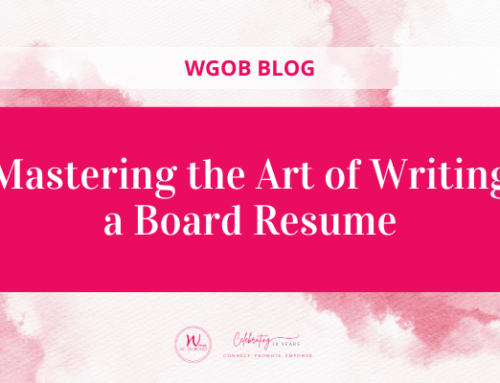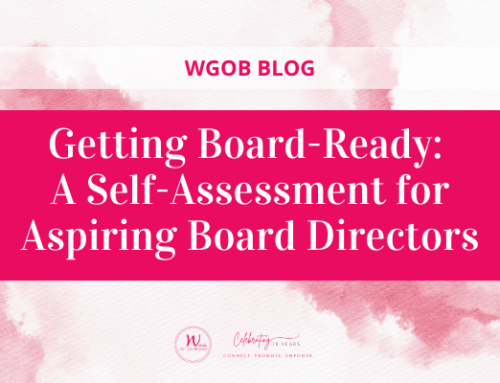Women Get On Board Inc. (WGOB) is a member-based company that connects, promotes and empowers women to corporate boards.
On April 27, WGOB hosted their virtual Speaker Series, which DirectorPrep.com sponsored. The candid fireside chat offered expert guidance on a challenging topic—asking courageous questions in the boardroom.
Deborah Rosati, FCPA, FCA, ICD.D, Corporate Director and WGOB Founder and CEO, kicked off the event by introducing Scott Baldwin, an entrepreneur, certified board director and co-founder of DirectorPrep.com.
Together, Scott and Deborah discussed governance courage—the courage that gives directors the confidence to ask the right questions at the right time. In a fireside chat based on DirectorPrep.com’s Savvy Director Guide to Governance Courage, they explored safe and powerful ways to overcome the natural fear that arises in all of us when we know the question that needs to be asked, and it’s up to us to ask it.
What does courage mean from a governance perspective?
Scott provided a simple but powerful definition of governance courage.
“Fundamentally, it’s doing the right thing for the right reason,” he said.
In a broad context, courage means speaking up for what is right, despite fear. Courageous directors act in the best interests of the organization they serve, regardless of any anxiety they may have about harming relationships or experiencing other adverse outcomes.
To further illustrate his explanation, Scott referenced the famous quote from Franklin D. Roosevelt:
“Courage is not the absence of fear but rather the assessment that something else is more important than fear.”
Deborah responded with her favourite quote on courage by Ernest Hemingway:
“Courage is grace under pressure.”
An example of courage in the boardroom
To illustrate the concept of governance courage, Scott recounted a moment from a recent board meeting. Around the boardroom table, directors discussed holding a town hall to promote member engagement but weren’t sure it would be possible due to the costs of paying the board members to attend. It was a longstanding convention for directors to be paid an honorarium for their work at this professional organization.
Scott’s instincts told him that something about this conversation wasn’t right. Why must the directors be paid to attend the town hall? He thought.
But as an experienced director, he knew that there was a better way to raise his concern. “Would this option be more viable if the cost was lower?” he asked instead.
It took courage to ask the question. Scott knew that not everyone would be willing to consider the possibility of attending the town hall without being paid. Still, by openly framing the question, he could boldly start discussing the option without offending anyone or appearing confrontational. It was more palatable to the audience, but the debate still went where it needed to go.
To muster up the courage to speak up, Scott said it’s helpful to remember your duty as a board member.
“You’re there to serve the stakeholders. That is your fiduciary duty—to do the right thing in the best interest of the organization,” he said.
Scott’s “aha” moment
For Scott, his “aha moment” was realizing that fear in the boardroom is natural. He recognized that his fear response was engrained and he should acknowledge it—and work around it. Now, instead of trying to talk himself out of his fear, he practices tactics to overcome it in the moment.
Deborah added that not every courageous moment has to happen within the boardroom. Some topics should be raised in the boardroom, but others might be more appropriate to discuss offline with the chair or CEO before a meeting. This way, you might be able to address concerns without taking up board time.
The three types of courage
According to Bill Treasurer, there are three types of courage: try courage, trust courage and tell courage. Scott explained that savvy directors know how to apply every kind of courage in the boardroom.
Try courage involves initiative and action. An example might be the drastic and necessary actions that many boards took to protect employees and stakeholders during the pandemic.
Trust courage is about having confidence in others and being open to making mistakes. At a board level, this could mean trusting the CEO to make decisions in the company’s best interest.
Tell courage is the courage to speak up, stick to your guns and do the right thing for the right reasons.
The last type of courage is the most vital for board directors. Great directors know they must speak up to ensure the organization is always acting in the best interests of its stakeholders.
For example, Deborah spoke about when she was overlooked for an appointment to the nominating and corporate governance committee on a board. Rather than let the opportunity pass by, she put up her hand in the board meeting and explained to her colleagues that she was interested in joining the committee. She spoke up because she knew she possessed the right expertise.
“Sometimes, things will be overlooked if you don’t speak up,” said Deborah. In this case, it turned out that her colleagues weren’t aware she was interested in the position. In the end, Deborah was invited to join the committee.
Deborah discusses speaking up in the boardroom in more depth in her blog post Finding Your Voice at the Boardroom Table.
Following your gut
A vital element of governance courage is following your gut when tensions arise in the boardroom or something feels off. It could be that the board isn’t functioning well, discussions are getting off track, decisions aren’t receiving adequate attention, the CEO has too much sway in the boardroom or a board member is not pulling their weight.
When courageous directors notice that something isn’t right, they don’t ignore it—they speak up and ask the questions that need to be asked. If no one else is doing it and it needs to be done, it comes down to you.
Deborah related an example from her time as board chair of a not-for-profit. The founder and CEO were not taking the right actions to ensure the organization’s success, and Deborah’s gut told her that a change needed to be made. Together with the rest of the board, she decided to remove the CEO.
Even though they received backlash, Deborah knew it was the right move in her gut. And she was proven correct. With a new leader in charge, the organization went on to thrive.
“I knew my job was to serve the best interests of the organization, and that’s what gave me the courage,” said Deborah. “In the end, it was very liberating because it was the right thing to do.”
Six tips for courage in the boardroom
Scott and Deborah examined six tips from Natalie Richardson’s article, Courage in the Boardroom, as part of the discussion. The tips are:
- Be clear on why you’re speaking out.
Remind yourself that you’re coming from a place of strength because asking questions is your fiduciary duty. Knowing why you’re speaking out can help to calm your nerves.
- Be concise.
Board meetings are short, so it is critical that you get to the point quickly.
- Say your point directly and constructively.
When you’re nervous, you may want to delay and justify. Instead, be direct and constructive. For example, say, “I respect what’s been said, but I disagree, and here’s why….”
- Stick to the facts.
If you dwell on how you feel, you may become overly emotional—and lose credibility.
- Maintain your composure.
Even if others become aggressive, it is more constructive to maintain grace under pressure.
- Stay on message.
If your point is glossed over or ignored, ensure that you return to it.
Key takeaways
Courage is one of the most valued traits in any board director. The good news? Anyone can be courageous. Speaking up in the boardroom is a learnable skill.
When discussing complex issues, stay calm, concise and on message. If you can maintain “grace under pressure,” as Hemingway puts it, you will be more likely to succeed.
Most importantly, remember that your fiduciary duty is to put the organization’s best interests before anything else. As Scott explains:
“It’s your job to speak out.”
No matter the type of board you belong to, your role is to serve and ask the right questions.
Are you a serving or aspiring corporate director interested in learning more about executive compensation and governance? Then, join us for our next WGOB Speaker Series on June 16: Trends in Executive Compensation and Governance: What Should Boards Be Thinking? In this WGOB Speaker Series virtual event, sponsored by Southlea Group, Ryan Resch and Amanda Voegeli will discuss trends in executive compensation and broader governance issues faced by board and HR committees in today’s environment. Register here.






